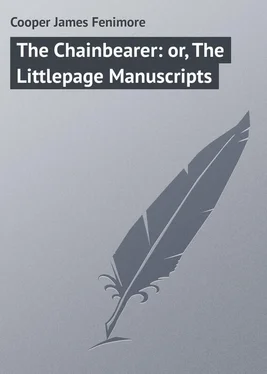James Cooper - The Chainbearer - or, The Littlepage Manuscripts
Здесь есть возможность читать онлайн «James Cooper - The Chainbearer - or, The Littlepage Manuscripts» — ознакомительный отрывок электронной книги совершенно бесплатно, а после прочтения отрывка купить полную версию. В некоторых случаях можно слушать аудио, скачать через торрент в формате fb2 и присутствует краткое содержание. Жанр: foreign_prose, на английском языке. Описание произведения, (предисловие) а так же отзывы посетителей доступны на портале библиотеки ЛибКат.
- Название:The Chainbearer: or, The Littlepage Manuscripts
- Автор:
- Жанр:
- Год:неизвестен
- ISBN:нет данных
- Рейтинг книги:5 / 5. Голосов: 1
-
Избранное:Добавить в избранное
- Отзывы:
-
Ваша оценка:
- 100
- 1
- 2
- 3
- 4
- 5
The Chainbearer: or, The Littlepage Manuscripts: краткое содержание, описание и аннотация
Предлагаем к чтению аннотацию, описание, краткое содержание или предисловие (зависит от того, что написал сам автор книги «The Chainbearer: or, The Littlepage Manuscripts»). Если вы не нашли необходимую информацию о книге — напишите в комментариях, мы постараемся отыскать её.
The Chainbearer: or, The Littlepage Manuscripts — читать онлайн ознакомительный отрывок
Ниже представлен текст книги, разбитый по страницам. Система сохранения места последней прочитанной страницы, позволяет с удобством читать онлайн бесплатно книгу «The Chainbearer: or, The Littlepage Manuscripts», без необходимости каждый раз заново искать на чём Вы остановились. Поставьте закладку, и сможете в любой момент перейти на страницу, на которой закончили чтение.
Интервал:
Закладка:
"I was surprised to find this plate here," I observed; "for, though my grandfather possessed a great deal of it, for one of his means, I did not think he had enough to be as prodigal of it as leaving it here would infer. This is family plate, too, but those arms are neither Mordaunt nor Littlepage. May I ask to whom they do belong?"
"The Malpones," answered the Chainbearer. "T'e t'ings are t'e property of Dus."
"And you may add, uncle Chainbearer, that they are all her property" – added the girl, quickly.
"I feel much honored in being permitted to use them, Miss Ursula," I remarked; "for a very pretty set they make."
"Necessity, and not vanity, has brought them out to-day. I broke the only teapot of yours there was in the house this morning, and was in hopes Frank would have brought up one from the store to supply its place, before it would be wanted; but he does not come. As for spoons, I can find none belonging to the house, and we use these constantly. As the teapot was indispensable, I thought I might as well display all my wealth at once. But this is the first time the things have been used in many, many years!"
There was a plaintive melody in Dus's voice, spite of her desire and effort to speak with unconcern, that I found exceedingly touching. While few of us enter into the exultation of successful vulgarity, as it rejoices in its too often random prosperity, it is in nature to sympathize with a downward progress, and with the sentiments it leaves, when it is connected with the fates of the innocent, the virtuous, and the educated. That set of silver was all that remained to Ursula Malbone of a physical character, and which marked the former condition of her family; and doubtless she cherished it with no low feeling of morbid pride, but as a melancholy monument of a condition to which all her opinions, tastes, and early habits constantly reminded her she properly belonged. In this last point of view, the sentiment was as respectable, and as much entitled to reverence, as in the other case it would have been unworthy, and meriting contempt.
There is a great deal of low misconception, as well as a good deal of cant, beginning to prevail among us, on the subject of the qualities that mark a gentleman, or a lady. The day has gone by, and I trust forever, when the mere accidents of birth are to govern such a claim; though the accidents of birth are very apt to supply the qualities that may really form the caste. For my own part, I believe in the exaggerations of neither of the two extremes that so stubbornly maintain their theories on this subject; or, that a gentleman may not be formed exclusively by birth on the one hand, and that the severe morality of the Bible on the other is by no means indispensable to the character. A man may be a very perfect gentleman, though by no means a perfect man, or a Christian; and he may be a very good Christian, and very little of a gentleman. It is true, there is a connection in manners, as a result, between the Christian and the gentleman; but it is in the result, and not in the motive. That Christianity has little necessary connection with the character of a gentleman may be seen in the fact that the dogmas of the first teach us to turn another cheek to him who smites; while the promptings of the gentleman are – not to wipe out the indignity in the blood of the offender, but – to show that rather than submit to it he is ready to risk his own life. 9 9 Mr. Mordaunt Littlepage would seem to have got hold of the only plausible palliative for a custom that originated in those times when abuses could only be corrected by the strong arm; and which, in our own days, is degenerating into the merest system of chicanery and trick. The duellist who, in his "practice," gets to be "certain death to a shingle" and then misses his man, instead of illustrating his chivalry, merely lets the world into the secret that his nerves are not equal to his drill! There was something as respectable as anything can be in connection with a custom so silly, in the conduct of the Englishman who called out to his adversary, a near-sighted man, "that if he wished to shoot at him , he must turn his pistol in another direction." – Editor.
But, I repeat, there is no necessary connection between the Christian and the gentleman, though the last who is the first attains the highest condition of humanity. Christians, under the influence of their educations and habits, often do things that the code of the gentleman rejects; while it is certain that gentlemen constantly commit unequivocal sins. The morality of the gentleman repudiates meannesses and low vices, rather than it rigidly respects the laws of God; while the morality of the Christian is unavoidably raised or depressed by the influence of the received opinions of his social caste. I am not maintaining that "the ten commandments were not given for the obedience of people of quality," for their obligations are universal; but, simply, that the qualities of a gentleman are the best qualities of man unaided by God, while the graces of the Christian come directly from his mercy.
Nevertheless, there is that in the true character of a gentleman that is very much to be respected. In addition to the great indispensables of tastes, manners, and opinions, based on intelligence and cultivation, and all those liberal qualities that mark his caste, he cannot and does not stoop to meannesses of any sort. He is truthful out of self-respect, and not in obedience to the will of God; free with his money, because liberality is an essential feature of his habits, and not in imitation of the self-sacrifice of Christ; superior to scandal and the vices of the busybody, inasmuch as they are low and impair his pride of character, rather than because he has been commanded not to bear false witness against his neighbor. It is a great mistake to confound these two characters, one of which is a mere human embellishment of the ways of a wicked world, while the other draws near to the great end of human existence. The last is a character I revere; while I am willing to confess that I never meet with the first without feeling how vacant and repulsive society would become without it; unless, indeed, the vacuum could be filled by the great substance, of which, after all, the gentleman is but the shadow.
Ursula Malbone lost nothing in my respect by betraying the emotion she did, while thus speaking of this relic of old family plate. I was glad to find, however, that she could retain it; for, though dressed in no degree in a style unbecoming her homely position as her uncle's housekeeper, there were a neatness and taste in her attire that are not often seen in remote parts of the country. On this subject, the reader will indulge my weaknesses a little, if I pause to say a word. Ursula had neither preserved in her dress the style of one of her sex and condition in the world, nor yet entirely adopted that common to girls of the class to which she now seemingly belonged. It struck me that some of those former garments that were the simplest in fashion, and the most appropriate in material, had been especially arranged for present use; and sweetly becoming were they, to one of her style of countenance and perfection of form. In that day, as every one knows, the different classes of society – and, kingdom or republic, classes do and ever will exist in this country, as an incident of civilization; a truth every one can see as respects those below , though his vision may be less perfect as respects those above him – but every one knows that great distinctions in dress existed, as between classes, all over the Christian world, at the close of the American war, that are fast disappearing, or have altogether disappeared. Now Ursula had preserved just enough of the peculiar attire of her own class, to let one understand that she, in truth, belonged to it without rendering the distinction obtrusive. Indeed, the very character of that which she did preserve, sufficiently told the story of her origin, since it was a subdued, rather than an exaggerated imitation of that to which she had been accustomed, as would have been the case with a mere copyist. I can only add, that the effect was to render her sufficiently charming.
Читать дальшеИнтервал:
Закладка:
Похожие книги на «The Chainbearer: or, The Littlepage Manuscripts»
Представляем Вашему вниманию похожие книги на «The Chainbearer: or, The Littlepage Manuscripts» списком для выбора. Мы отобрали схожую по названию и смыслу литературу в надежде предоставить читателям больше вариантов отыскать новые, интересные, ещё непрочитанные произведения.
Обсуждение, отзывы о книге «The Chainbearer: or, The Littlepage Manuscripts» и просто собственные мнения читателей. Оставьте ваши комментарии, напишите, что Вы думаете о произведении, его смысле или главных героях. Укажите что конкретно понравилось, а что нет, и почему Вы так считаете.












